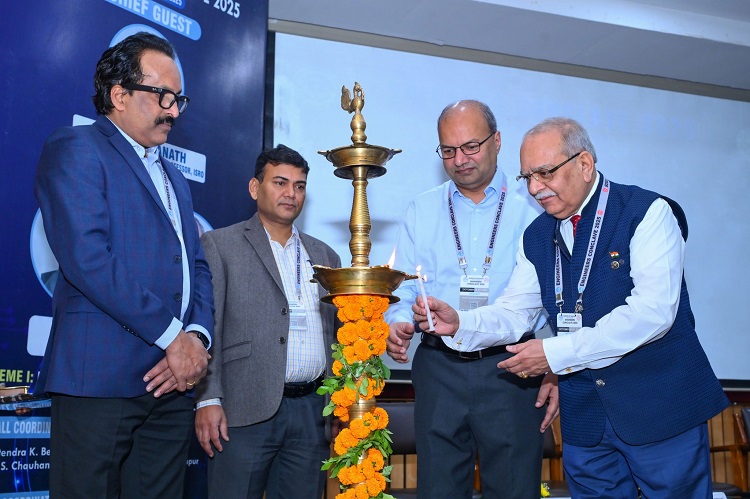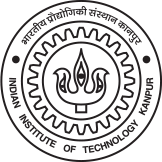
IIT Kanpur Hosts Engineers Conclave 2025 to Shape the Future of Intelligent and Cyber-Physical Systems
Kanpur , 31 October 2025
Source: Information and Media Outreach Cell, IIT Kanpur
Kanpur, October 28, 2025: Engineers Conclave 2025 (EC-2025), the annual mega flagship event organized by the Indian National Academy of Engineering (INAE) jointly with major engineering institutions of the country, was successfully organized jointly with the Indian Institute of Technology (IIT) Kanpur on October 28-29, 2025, in the IIT Kanpur campus.
This year’s conclave, the twelfth in the series, brought together the country’s leading engineers, technologists, and researchers from Academic Institutions, R&D Organizations, and Industry; domain experts from allied fields, and policymakers. With the two themes focusing on “Intelligent Systems” coordinated by Prof. Aditya K Jagannatham, Professor, Department of Electrical Engineering, IIT Kanpur and “Interdisciplinary Cyber Physical Systems” coordinated by Prof. Santanu Chaudhury, Vice-President, INAE, former Director IIT Jodhpur & Professor, Department of Electrical Engineering, IIT Delhi,” which are critical for India's economic growth, social development, and national security, enabling the fusion of digital and physical infrastructure; the conclave addressed the challenges and opportunities for advancement in these niche areas of engineering importance to the Nation. During the conclave, notable engineering luminaries deliberated on the state-of-the-art technologies and latest R&D developments in the overarching area of Cyber Physical Systems and delivered illuminating technical talks on the two critical themes of “Intelligent Systems” and “Interdisciplinary Cyber Physical Systems”.
The event was co-chaired by Mr. J.D. Patil, President, INAE & Member, Board of IN-SPACe; Chairman, Indian Space Association (ISpA); Trustee, L&T Employee Trust; Former Whole Time Director – Defence & Smart Technologies, Larsen & Toubro Limited; and Former Director, L&T Semiconductor Technologies Limited; and Prof. Manindra Agrawal, FNAE, Director, IIT Kanpur.
A PLATFORM FOR NATIONAL ENGINEERING EXCELLENCE
Delivering the welcome address, Prof. Yogesh S. Chauhan, FNAE, Head of the Department of Electrical Engineering at IIT Kanpur, emphasized the significance of collaborative technological innovation, stating that “Platforms like the Engineers Conclave empower the nation’s brightest minds to envision solutions for complex challenges across sectors collectively.”
The Chief Guest, Dr. S. Somanath, FNAE, Prof. Vikram Sarabhai Distinguished Professor, ISRO; Chancellor, Chanakya University, Bengaluru; Former Secretary, Department of Space; and Former Chairman, ISRO, delivered an inspiring keynote. He emphasized, “The themes of Cyber-Physical Systems and Intelligent Engineering chosen for the Conclave are in line with the mission mode of the Government, and it is already showing significant results. We are all part of cyber-physical systems. Chandrayaan is a beautiful example of a cyber-physical system wherein the software prepared for Chandrayaan 2 was upgraded to be utilized for the successful launch of Chandrayaan 3.” He further went on to describe the extensive potential of cyber-physical systems in medicine, manufacturing, and multiple domains, noting that they contain many layers.
Mr. J.D. Patil, President, INAE, in his Presidential Address, shared the vision and evolution of INAE and the significance of the Engineers Conclave. He noted, “The Conclave stands as a living example of how academia and industry can jointly shape policies, influence engineering education, and promote indigenous innovation for nation-building.”
In his address, Prof. Manindra Agrawal, Director, IIT Kanpur, emphasized the convergence of academia, research, and industry for national growth. Mentioning the ongoing activities in the Institute focused on Cyber Physical Systems through initiation of research programs and training of technical workforce and supporting of start-ups and mentoring programs, He remarked, “The future of Indian engineering lies in harnessing interdisciplinary synergy—in domains like intelligent systems and cyber-physical technologies—that can propel us toward building a self-reliant and digitally empowered India.”
The two-day event hosted plenary talks, parallel technical sessions, and networking interactions, providing a dynamic platform for eminent engineering experts, academicians, technology leaders, and administrators to conduct meaningful deliberations with fruitful outcomes on the two themes. The event highlights included Parallel Technical Sessions on both themes, which provided an opportunity for the delegates to gain knowledge of the latest technological developments, challenges and scope for future growth in allied areas.
The first Plenary Talk, titled “Self-Reliant AI/ML in Engineering: Education, Research and Technology Development”, was delivered by Prof. P.P. Chakrabarti, FNAE, Professor, Department of Computer Science and Engineering & Former Director, IIT Kharagpur. He emphasized that “Artificial Intelligence, when coupled with indigenous research and ethical frameworks, can empower India to lead globally in digital innovation.”
The second Plenary Talk, “Cyber Physical Systems in Defense Manufacturing Industry 4.0 and Beyond”, was delivered by Mr. J.D. Patil, who highlighted, “Integrating cyber-physical systems into defense manufacturing will not only enhance precision and efficiency but also position India as a global leader in smart defense technologies.”
TOWARDS ACTIONABLE OUTCOMES
The Valedictory Session, chaired by DrPS Goel, Former President INAE, featured the summing up of technical sessions by the respective theme coordinators. They presented key recommendations focusing on actionable engineering interventions to serve as inputs for policy formulation and R&D advancement.
In his concluding remarks, Dr Goel noted, “Engineers Conclave 2025 has succeeded in identifying concrete technological pathways that can strengthen India’s innovation ecosystem and bridge the gap between research and implementation.”
The conclave reaffirmed INAE’s mission to promote the practice of engineering and technology for solving problems of national importance. The actionable recommendations emerging from EC-2025 will be shared with relevant government departments, industries, and R&D agencies to further the growth of state-of-the-art indigenous technologies in the crucial areas of Intelligent Systems and Cyber Physical Systems—paving the way for a technologically empowered and self-reliant India.
For more information, please visit: www.iitk.ac.in
About INAE
The Indian National Academy of Engineering (INAE), founded on April 20, 1987, as a Society under the Social Registration Act, is an autonomous professional body located at Technology Bhawan, New Delhi. It comprises India’s most distinguished engineers, engineer-scientists, and technologists covering the entire spectrum of engineering disciplines. INAE functions as an apex body and promotes the practice of engineering and technology and the related sciences for their application to solving problems of national importance. The Academy also provides a forum for futuristic planning for the country’s development, requiring engineering and technological inputs, and brings together specialists from such fields as may be necessary for comprehensive solutions to the needs of the country. The actionable recommendations emanating from the deliberations of technical events and programs are submitted to the concerned government departments/Agencies for consideration as inputs for framing of national policies. As the only engineering Academy of the country, INAE represents India at the International Council of Academics of Engineering and Technological Sciences (CAETS), a premier non-governmental international organization comprising Member Academics from 33 countries across the world, to contribute to the advancement of engineering and technological sciences to promote sustainable economic growth.
About IIT Kanpur
The Indian Institute of Technology Kanpur, established in 1959, holds the distinction of being recognized as an Institute of National Importance by the Government of India through an Act of Parliament. Renowned for its excellence in science and engineering education, IIT Kanpur has made significant contributions to research and development over the decades. Its expansive, lush green campus spans 1,050 acres and hosts a rich array of academic and research resources. The institute comprises 20 departments, 26 centers, three interdisciplinary programs, and three specialized schools across engineering, science, design, humanities, and management disciplines. With over 590 full-time faculty members and more than 9,500 students, IIT Kanpur remains a leader in fostering innovation and academic rigor.
For more information, please visit: www.iitk.ac.in




